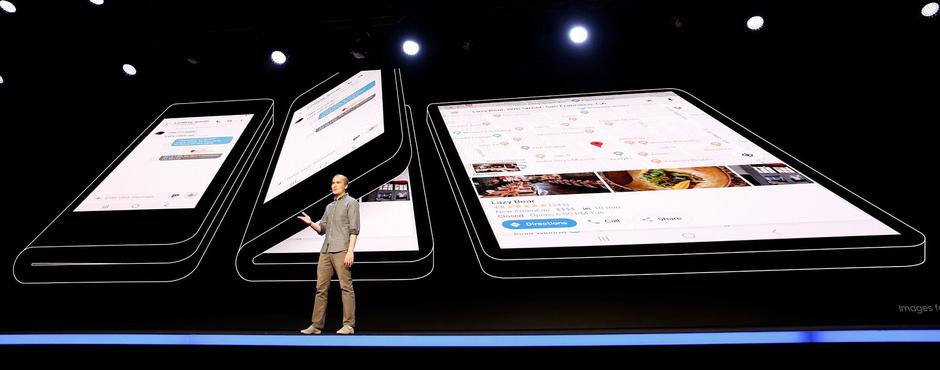07.11.2018 | Samsung introduces first foldable smartphone
The world's largest mobile phone manufacturer introduces its first foldable phone. It is to help the South Koreans to new growth in the weakening Smartphone sales.

The world's largest mobile phone manufacturer introduces its first foldable phone. It is to help the South Koreans to new growth in the weakening Smartphone sales.
Folded a smartphone, opened a tablet.
San Francisco. At its fifth developer conference in San Francisco, Samsung introduced a foldable smartphone with a flexible, foldable screen. "We are entering a new era of innovation and invention," said DJ Koh, President and CEO of Samsung Electronics, in front of 500 developers.
Samsung wants to redefine the future of mobile services for the Galaxy family's tenth anniversary next year: with a device that owners can use folded in the middle as a smartphone and open as a tablet.
This creates two screens: a small front and a 7.3-inch display in the middle. Justin Denison, SVP of Mobile Product Marketing, calls the smartphone "the foundation for the smartphone of tomorrow". The phone's kinky display is very robust and can be folded "thousands of times", according to Denison.
The material used is 45 percent thinner than previous screens. The phone should be kinked hardly thicker than a regular Galaxy model, so the idea. The three surfaces of the phone can be played in parallel: Up to three apps start parallel on the device. Samsung calls the function "Multiactive Window".
To the size of the inside screen, price or launch of the new model, the company gave no information. Mass production should start "in the coming months," announced Denison, who presented the device in a darkened light, because the group still does not want to reveal all the details.
New growth for smartphones
With the foldable device, the South Korean manufacturer wants to catch up in the smartphone business, where he loses for several months. According to data companies IDC and Strategy Analytics, Samsung's sales fell 13 percent last quarter, down from 10 percent in the second.
"Samsung is the clear leader in the smartphone business," analyzes Thomas Husson of Forrester. But meanwhile the manufacturer gets under pressure. In the lower price range threatened him Chinese producers such as Huawei and Xiaomi, in the premium segment Samsung could not assert itself against the latest X-generation of Apple.
A new, foldable design could help Samsung distinguish itself from the competition and grow again, Husson believes. "But only if it offers real benefits for the daily life of the user." Just as important as a new hardware design are software, technology and services adapted to the new design.
Fight of language assistants
But apps that can be programmed for the foldable smartphone did not show much at the developer conference. Instead, Samsung emphasized the importance of Bixby, its own platform for intelligent voice control. The smart assistant is to move long-term into all 500 million devices that the manufacturer sells annually, announces Eui Suk Chung, Samsung's Head of Software and AI.
To increase the reach of the technology, Samsung opens the Bixby platform for third parties. The programmers can program their own functions for the technology with "Bixby Capsules", promises Samsung, after the model of the "Skills" of Amazons Alexa, which turns on a lamp in the networked home or orders a driving service. Samsung wants to sell all Bixby applications through its own marketplace.
"The smart assistant market is still in its infancy," said Dag Kittlaus, CEO of Viv Labs, an AI company that acquired Samsung in October 2016. "The time to go to this market has come now."
But actually, Samsung is rather laggard in the market. Amazon, Google and Apple have established their own language technologies for years. Samsung introduced Bixby in March 2017 on the Galaxy Note 8, almost three years after the launch of pioneer Alexa.
The influence in the market is manageable. Only six percent of Americans use Bixby, the British data company Ovum calculated. Samsung is far behind Amazon (24 percent), Apple (22 percent), Google (20 percent) or Microsoft (10 percent).